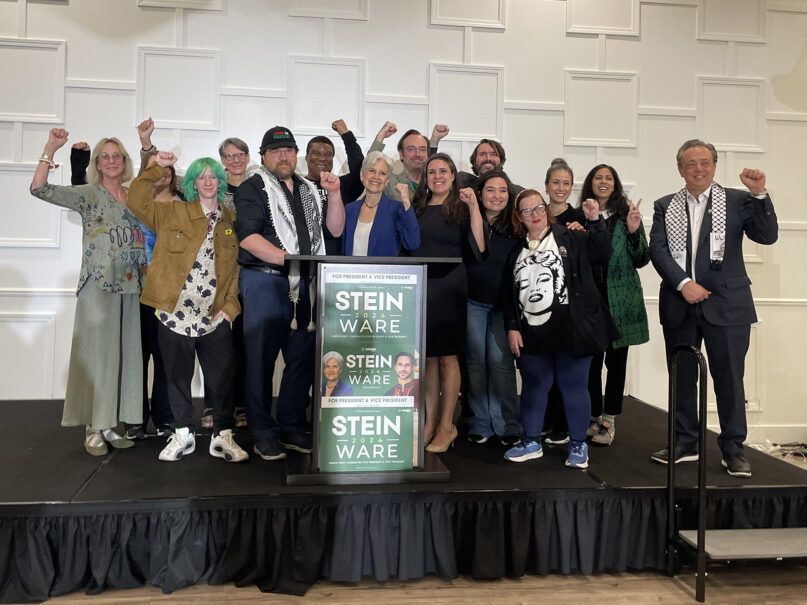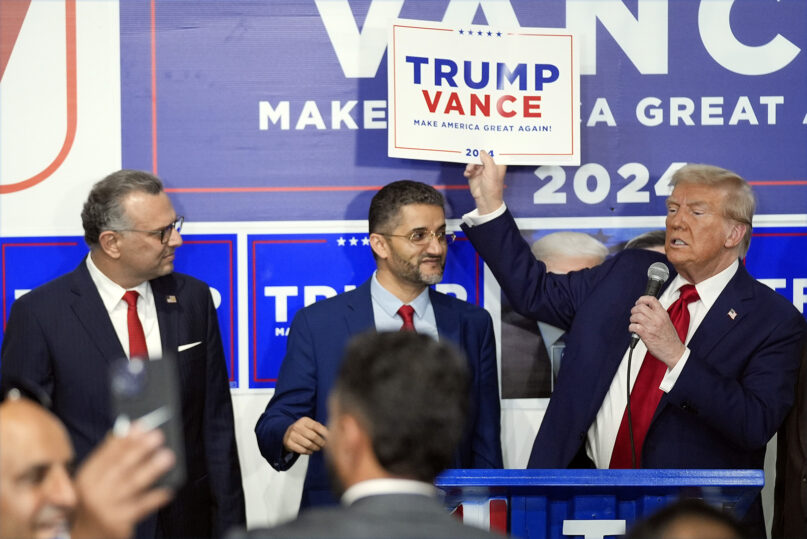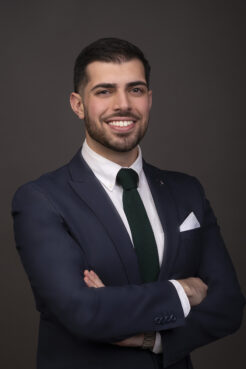For Arab Americans and Muslims in newly red Dearborn, a mix of defiance, ambivalence, fear

DEARBORN, Mich. (RNS and NPR) — Jumana Judeh understands why so many in her Arab American community voted the way they did in last week’s presidential election, even as she had tried to get them to change their mind, endorsing Kamala Harris in the final days before the election.
“It wasn’t the outcome that I was hoping for. But at the same time, I think the Arab community got their message across that we could no longer be taken for granted,” said Judeh, a Christian and a Palestinian American. “Even though we’ve paid a heavy price.
“I’m scared. I have no clue what Trump is going to do. I don’t think Trump knows what he’s going to do,” she added.
Home to one of the largest Arab American communities in the country, Dearborn, Michigan, has long been considered a Democratic stronghold. This election, the city went Republican for the first time since 9/11, with 42% voting for former President Donald Trump and only 36% supporting Vice President Harris. Nearly 1 in 5 voted for third-party candidate Jill Stein.
For months, including throughout the primaries, Arab Americans and Muslims around the country have vowed to vote “uncommitted,” third party or Republican in protest of the Biden administration’s continued support of Israel and its deadly military operations in the Gaza Strip, where more than 40,000 Palestinians have been killed.
Stein, who received 18% of the city’s vote, was at the Dearborn Banquet Hall on election night for a Green Party watch party, along with members of the Abandon Harris campaign.

Green Party presidential candidate Jill Stein, center, poses with supporters at the Dearborn Banquet Hall, Nov. 5, 2024, in Dearborn, Mich. (Photo by Nargis Rahman)
“Dearborn is ground zero for fighting the genocide and for demanding democracy that actually listens to the American people. So, it’s not only Muslim Americans, but it’s all of Americans who are demanding an end to this genocidal war,” Stein said.
Zeinab Chami, a Dearborn Public Schools teacher who voted for Stein, was among a crowd of people at The Canteen at Midtown food court in Dearborn on election night watching TV screens as the results rolled in.
“I expect really nothing from the national elections. I don’t think they’re going to change their positions on anything,” said Chami. “I do agree with the notion that we have to punish the Democratic Party.”
The Council on American-Islamic Relations conducted an exit poll of American Muslim voters Nov. 5-6. Robert McCaw is the director of government affairs at CAIR. He said the poll found 53% of Muslim voters nationwide voted for Stein, 21% voted for Trump and 20% voted for Harris.
“This poll really represents a three-way race in the Muslim community, which is a first time for us, and we chalk that up to deep disillusionment with the candidates due to the Gaza genocide,” he said.

Republican presidential nominee former President Donald Trump, right, speaks as Hamtramck Mayor Amer Ghalib, center, and Massad Boulos, left, listen at a campaign office, Oct. 18, 2024, in Hamtramck, Mich. (AP Photo/Evan Vucci)
McCaw said Harris really alienated Muslim voters — noting her use of Liz Cheney as a surrogate, whose father was the vice president of an administration that escalated its military presence in the Middle East during the Iraq War. Meanwhile, Trump campaigned in Michigan and promised an end to the war.
“Muslim voters, going forward, expect Donald Trump to uphold his end of the bargain and pursue peace immediately in the region,” he said.
But little more than a week after the election, some Muslims have raised the alarm over the president-elect’s Cabinet picks, including former Arkansas Gov. Mike Huckabee as ambassador to Israel and Florida Sen. Marco Rubio as secretary of state. Both are avid supporters of Israel’s war in Gaza.
And Pennsylvania Sen. John Fetterman, a Democrat, lashed out at the community in an interview with Semafor, saying: “So, Dearborn delivered for Trump? OK, congratulations. You’re going to love the next Muslim ban.”
But for many Muslim supporters of Trump — a candidate who campaigned on mass deportations and in his first term instituted the “Muslim ban” against immigrants from several majority-Muslim countries — the choice was always an ambivalent one.
“We don’t necessarily agree with all his policies. We would have loved to have found a home in the Democratic Party,” said Faye Nemer, founder of the MENA American Chamber of Commerce, who said she voted for Trump as a protest vote against Democrats.
“As a woman, I would have loved to see a woman as president. But unfortunately, that did not manifest for us, because she (Harris) wasn’t receptive to our concerns, to our community’s concerns,” Nemer said.
The community is quiet, said Judeh, “because even though some of them supported Trump, we can’t forget that he wanted to, you know, deport all Muslims and stop Muslims from coming into the country.”
In response to Fetterman’s comments, Dearborn Mayor Abdullah Hammoud — the first Arab American and first Muslim to hold that post — said people in his city are hurting now, with “almost everybody I know” having lost a loved one or having a loved one injured in Gaza or in Lebanon, where the war has spread. That pain has an urgency to it, he said.
“People here feel betrayed. For nearly one year, we warned the Democratic presidential candidates on the issue of Gaza,” said Hammoud, who had refused to meet with Trump or endorse Harris before the election, in an interview with MSNBC. “Tell us today why it was worth the risk of a Donald Trump presidency for you to stand in strong alignment with Benjamin Netanyahu and his cabinet of war criminals?”
Imam Mustapha Elturk, the president of the Islamic Organization of North America in Warren, Michigan, a county where Trump won 56% of the vote, says he’s encouraging congregants to accept the results of the election.

Bilal Hammoud is executive director of the American Arab Chamber of Commerce. (Courtesy photo)
“It’s God’s will, literally,” he said. “I try to let our community understand, that no matter who the people vote for, it is in God’s wisdom, we have to accept and be content with the results, even if they did not turn out to our favor.”
He says people should be united despite their differences and work together to be civically engaged, hold officials accountable and consider running for office.
Bilal Hammoud, the executive director of the American Arab Chamber of Commerce, said that no matter how they voted, there was no winning for Arab Americans, describing the atmosphere of the election night Canteen party as “somber” and “anxious.”
“Ultimately, even though some of them got what they were looking for, it wasn’t a celebratory energy,” Hammoud said. “That room was just anxious because nothing was going to result in a victory for this community.”
“What we did see was a deep anxiety that was felt and now knowing as the reality sinks in of what today brings and tomorrow,” Hammoud said, describing “a deep sense of fear for where this country is headed.”
Judeh didn’t support Trump, but she believes the only way forward for Arab Americans is to put party politics aside.
“I would like to see the Democrats and the Republicans in the community come together and try to deal with this president now that we have him for four years,” she said.
Nargis Rahman is with NPR member station WDET.
This story was produced through a collaboration between NPR and RNS. Listen to the radio version of the story.
Source link


